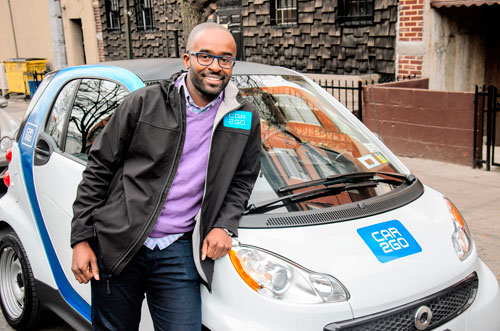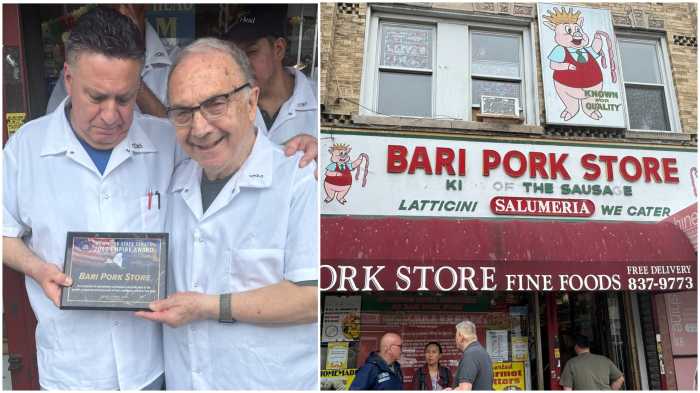Moving your car once a week for street cleaning seems like a breeze compared to this guy’s job.
The car company Daimler launched its car-share service Car2Go in Brooklyn back in October, allowing people to pick up a Smart car on the street, and unlike competitor Zipcar, drop it off in any on-street parking space in a designated area. But the constant motion of the two-seat cars, and the ever-present threat of alternate-side parking rules mean it takes a lot of work to keep the cars evenly distributed and out of the impound lot. We rode along with one of the workers who spends his days shuffling vehicles to avoid the street sweepers. He said the distinctive cars raise eyebrows and prompt a lot of questions.
“The first thing people ask when they see the car is, ‘What is this?’ ” said Angel Rivera, a Bushwick native who moves 50 or 60 cars each day. “The second thing they ask is ‘How much does it cost?’ ”
The service charges a one-time fee of $35, then charges per trip, by the minute, hour, or day, at rates of $0.41, $14.99, and $84.99 respectively. The company currently has a fleet of 400 rides parked alongside curbs from Williamsburg to Coney Island, and uses a crew of 40 to keep them gassed up and off of tow trucks. In the winter the hired hands have the added duty of shoveling the cars out of the snow.
Daimler first tried offering the service in Germany in 2009 and has since expanded to 60 cities worldwide, attracting 1 million members, according to a spokesman for the company. The Brooklyn system already has 15,000 members, and executives have had to add 150 cars to the fleet since launching, the spokesman said.
“It’s the fastest-growing market in North America,” said Tom McNeil, manager of the Brooklyn arm of the company.
To keep the wheels spinning, each day Rivera is given a list of cars that he needs to deal with, either by moving them to a nearby parking space, gassing them up, or driving them to another neighborhood that is short on cars. Our ride together included a trip to Cobble Hill, where one of the cars was low on fuel.
We rolled up to the car in need and a neighbor with a dog stopped to show us his Car2Go membership card.
“It’s super hard to find parking,” Olav Christensen said. “That’s why we’ve never owned a car here. This is a really clever solution.”
Daimler makes the Smart car, and Car2Go is a way for the manufacturer to profit from people who who need a set of wheels now and then, Asante said.
“We’re helping people that don’t have cars and don’t want cars. This is a way to open a new market of customers,” he said.
Registered members can pull up a map on their phone that shows where the available Car2Go vehicles are parked. A swipe of a card at a sensor on the cars’ windshields opens them up. Members can travel up to 150 miles in one session and keep the car for as many as four days. At the end of a trip, members can park in any space on the street in the coverage area, as long as street-cleaning restrictions do not go into effect for more than 24 hours on a street that is cleaned twice a week, or 12 hours on a street that is cleaned four times a week.
The service is more convenient when dropping off the car in less-congested areas, since on-street parking can be difficult to find in neighborhoods such as Downtown. Rivera said the car’s diminutive size does make things a little easier, but Asante said the company is looking into renting spaces in parking garages to ease the burden.
“We’re working on acquiring spaces all over the borough, but especially Downtown,” Asante said, after spending about 45 minutes circling The Brooklyn Paper’s MetroTech Center office hunting for a spot.
Car2Go found office space in Sunset Park’s Industry City, a location Asante said the company chose because of the influx of new businesses to the area.
“It’s a neighborhood that’s building up and changing,” he said. “Our coming here speaks to us wanting to be a part of that growth.”
Techno Files
John Dewey High School is hosting a robotics competition this weekend as part of the First Tech Challenge, run by the nation-wide youth science organization For Inspiration and Recognition of Science and Technology. Teams from the school will compete against other area students to make robots that can play a game called Cascade Effect, which involves obstacles and moving around plastic balls.
• • •
Public Advocate Letitia James held a public hearing about the proposed merger between Time Warner Cable and Comcast last week. A panel discussed how the merger could give the internet and television service provider a monopoly and unfair advantage in the city, and if the merger would increase the digital divide between poor and wealthy communities.
• • •
Just in time for the holidays, Ebay has added 80 Brooklyn businesses to its Ebay Local program this week. The stores will offer delivery and in-store pickup to shoppers on the site. The online auction house is running similar programs in four other cities in the United States, and three abroad.



























